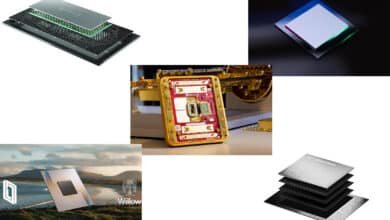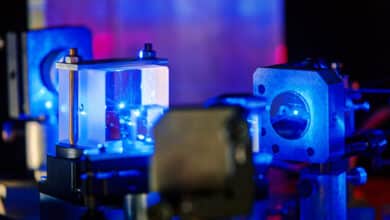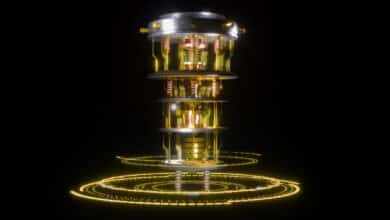Quantum Computing
PostQuantum.com – Industry news and blog on Quantum Computing, Quantum Security, PQC, Post-Quantum, Quantum Tech
-
Why I Founded Applied Quantum – The First Pure-Play, End-to-End Quantum Consultancy
Applied Quantum is a firm that for the first time would be 100% dedicated to quantum technology services – not as a sideline, not as one emerging tech practice among many, but as the entire mission of the company, and it would cover the field end-to-end. We founded Applied Quantum…
Read More » -
Quantum Programming: An In-Depth Introduction and Framework Comparison
Quantum programming is an emerging discipline that challenges developers to think beyond classical bits and deterministic algorithms. Instead of manipulating binary 0s and 1s, quantum programmers work with qubits that can exist in multiple states at once and harness phenomena like superposition and entanglement to perform computations in fundamentally new…
Read More » -
How Quantum Could Break Through Amdahl’s Law and Computing’s Limits
Amdahl’s Law teaches us a humbling lesson about the limits of classical computing: there is always a portion that resists parallel speedup, chaining us to diminishing returns. We’ve coped by clever engineering – making that chain as short as possible – but not broken it. Quantum computing offers a bolt…
Read More » -
Quantum Technologies and Quantum Computing in South Korea
South Korea’s quantum technology ecosystem has rapidly matured from obscurity into a well-organized force. Backed by a clear national strategy and increasing investments, Korea is making its mark through cutting-edge research at top universities, substantial government support for quantum computing and communications, and active participation from industry giants and startups…
Read More » -
Quantum Technologies and Quantum Computing in the Middle East
Leaders in the Middle East are talking about quantum algorithms and national quantum computing hubs. And even about Quantum AI. The Middle East is determined not to miss out on the quantum revolution, and that determination is reshaping the tech narrative of this region. What’s behind this quantum push in…
Read More » -
The Race Toward FTQC: Ocelot, Majorana, Willow, Heron, Zuchongzhi
Quantum computing is entering a new phase marked by five major announcements from five quantum powerhouses—Amazon Web Services (AWS), Microsoft, Google, IBM, and Zuchongzhi—all in the last 4 months. Are these just hype-fueled announcements, or do they mark real progress toward useful, large-scale, fault-tolerant quantum computing—and perhaps signal an accelerated timeline…
Read More » -
Quantum Geopolitics: The Global Race for Quantum Computing
Quantum computing has emerged as a new frontier of great-power competition in the 21st century. Nations around the world view advanced quantum technologies as strategic assets—keys to future economic prowess, military strength, and technological sovereignty. Governments have already poured over $40 billion into quantum research and development globally, launching national…
Read More » -
Quantum Use Cases in Telecom
Quantum computing’s impact on global telecommunications will be transformative. It holds the potential to revolutionize how we secure and operate networks, enabling levels of performance and protection previously unattainable. At the same time, it forces a reckoning with the vulnerabilities of our current systems. The journey to fully realize quantum-enhanced…
Read More » -
Quantum of Flapdoodle: A Guide to Quantum Hype and Scams
The gap between the hard reality of quantum engineering and the sensational way it’s often portrayed has created a fertile breeding ground for misinformation and fraud. It ranges from innocuous exaggeration, to willful marketing spin, to serious financial scams and wild pseudoscience. Think of it as a “know your enemy”…
Read More » -
Quantum Use Cases in Healthcare & Medical Research
Quantum computing has the potential to reshape global healthcare and medical research in the coming decades. From our current vantage point, we can see glimmers of its future impact: prototype quantum algorithms already accelerating drug discovery, early collaborations bringing quantum hardware into hospital research labs, and quantum-inspired methods optimizing healthcare…
Read More » -
Entropy-Driven Photonic Quantum Computing: A Critical Look at QCI’s Approach
Quantum Computing Inc. (QCI) has introduced an unconventional paradigm in quantum computing called Entropy Quantum Computing (EQC). Unlike the standard approach of isolating qubits in pristine, ultra-cold environments, QCI’s method intentionally embraces environmental noise and loss as part of the computation. Their quantum processors, optical devices operating at room temperature,…
Read More » -
From NISQ to FTQC to FASQ
The dream of quantum computing is inching closer to reality, but between our current noisy prototypes and tomorrow’s transformative machines lies a daunting gulf. In the language of the field, we are transitioning from the NISQ era into the realm of FTQC, with an eye on the ultimate prize dubbed…
Read More » -
China’s Quantum Computing and Quantum Technology Initiatives
In little over a decade, China transformed from a minor player into a quantum technology powerhouse. The talent has matured, and a new generation of Chinese quantum scientists is coming into its own – many trained at top universities domestically and abroad, now supported by some of the best facilities…
Read More » -
Quantum Technology Initiatives in Singapore and ASEAN
ASEAN’s journey in quantum technology is relatively recent but steadily gaining momentum. Singapore took the lead in the early 2000s – the National Research Foundation began funding quantum research as early as 2002, and by 2007 the government helped establish the Centre for Quantum Technologies (CQT) at the National University…
Read More » -
Quantum Technologies and Quantum Computing in Russia
Russia’s engagement with quantum science dates back to the Soviet era, which produced a strong foundation of theoretical physics and early quantum experiments. This legacy endures in the modern era – Russian experts often note that the “Soviet school of quantum physics was one of the best in the world,”…
Read More »














